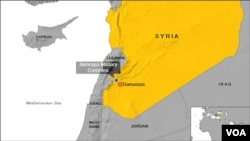A top Iranian official says Israel will regret its latest "aggression" against Syria.
The head of Iran's National Security Council, Saeed Jalili, said Monday in a visit to Damascus that the Muslim world supports Syria.
Jalili's comments came a day after Israeli Defense Minister Ehud Barak said last week's airstrike in Syria shows Israel is serious about preventing heavy weapons from flowing into Lebanon, appearing to hint for the first time that his government was behind the operation.
Israel has maintained official silence over the raid, which U.S. and regional security sources say involved Israeli aircraft hitting a Syrian convoy transporting anti-aircraft weapons likely intended for the Lebanese militant group Hezbollah.
Barak did not directly claim responsibility for the attack when he addressed the Munich Security Conference on Sunday.
But in his country's first public comments about the operation, he said the airstrike was "proof that when we say something, we mean it. We say that we don't think it should be allowed to bring advanced weapons systems into Lebanon." Barak said he could not add anything to what has already been reported regarding "what happened in Syria several days ago."
In the days ahead of the strike, Israeli officials warned repeatedly that Hezbollah's acquisition of surface-to-air missiles from Syria would be a "game changer."
The Syrian government has said Israeli jets targeted the Jamraya military research facility outside Damascus.
In his first reported response to the attack, Syrian President Bashar al-Assad accused Israel Sunday of seeking to destabilize Syria and said his military forces could confront "any aggression'' against it.
Syrian ambassador to Lebanon Ali Abdul-Karin Ali has said Damascus has the "option" of carrying out a "surprise" response to the alleged Israeli attack. He did not elaborate his remarks to Lebanese website Al-Ahad.
The head of Iran's National Security Council, Saeed Jalili, said Monday in a visit to Damascus that the Muslim world supports Syria.
Jalili's comments came a day after Israeli Defense Minister Ehud Barak said last week's airstrike in Syria shows Israel is serious about preventing heavy weapons from flowing into Lebanon, appearing to hint for the first time that his government was behind the operation.
Israel has maintained official silence over the raid, which U.S. and regional security sources say involved Israeli aircraft hitting a Syrian convoy transporting anti-aircraft weapons likely intended for the Lebanese militant group Hezbollah.
Barak did not directly claim responsibility for the attack when he addressed the Munich Security Conference on Sunday.
But in his country's first public comments about the operation, he said the airstrike was "proof that when we say something, we mean it. We say that we don't think it should be allowed to bring advanced weapons systems into Lebanon." Barak said he could not add anything to what has already been reported regarding "what happened in Syria several days ago."
In the days ahead of the strike, Israeli officials warned repeatedly that Hezbollah's acquisition of surface-to-air missiles from Syria would be a "game changer."
The Syrian government has said Israeli jets targeted the Jamraya military research facility outside Damascus.
In his first reported response to the attack, Syrian President Bashar al-Assad accused Israel Sunday of seeking to destabilize Syria and said his military forces could confront "any aggression'' against it.
Syrian ambassador to Lebanon Ali Abdul-Karin Ali has said Damascus has the "option" of carrying out a "surprise" response to the alleged Israeli attack. He did not elaborate his remarks to Lebanese website Al-Ahad.






